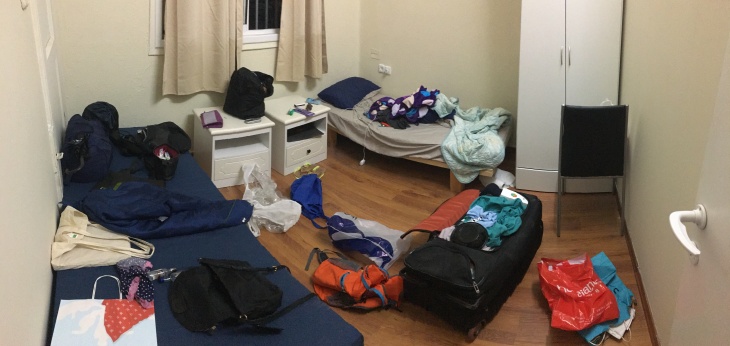Tomorrow marks the end of my five-month program. At 9:30 a.m., we’ll be out on the streets – some of us staying here in Israel, others heading home.
In some ways, I can’t believe how long ago the first few days feel. The first day I walked in, sweaty and out of breath after lugging my way-too-heavy suitcases up the stairs in 90+-degree heat, to find some of my new roommates and our madrich (program adviser) sitting in the kitchen. I was immediately overwhelmed by the new personalities, the apartment, the realization that this was the setting for the next five months of my life.
Those first few days, I genuinely didn’t know if I was going to make it. I knew only a couple of people in Tel Aviv outside of my program. I felt way too old to be on the program at all, let alone to be in an apartment with seven other people, sharing a room. I was beyond grossed out by our bathroom and shower situation (my hair phobia didn’t help matters). Our power went out the first night, yielding a sleepless, sweaty night. I was tired, anxious and scared. I started looking for a sublet.

When I realized I wasn’t actually going to move out, I tried to make the best of my apartment situation. I barely (read: never) cooked because our kitchen grossed me out so much. Our eight personalities clashed in sometimes ugly ways. Our apartment became so moldy with the winter rain that three people actually moved out. But hey – I made it. I was lucky to get along well with my roommate (truly the most important), and I only fell out of my twin-sized bed once. I didn’t overcome my hair phobia, but I’m alive and didn’t inhale so much mold that I have brain damage (that I know of, anyway).
I quickly came into my own on the program. I reassured myself that age is just a number, and that I can survive five months anywhere. And thankfully, I was right.
I made friendships I know will last a lifetime. I’m excited to know people all around the world – Argentina, Brazil, France, Hungary, Russia, Germany… even Canada! Though I didn’t meet nearly as many Israelis as I might have liked or expected, I know that’s partially on me, and I’m making a strong effort now that I’m staying.
My internship was a fantastic experience. I learned about the world of public relations, and met some truly wonderful people along the way. I also got to interact with Israel’s high-tech startup scene (and I now know more about cybersecurity than I ever expected!).
I finally feel like a local in Tel Aviv (maybe not Israel, but at least Tel Aviv) as opposed to a tourist. I can figure out the buses and have yelled “Rega! Nahag!” (“Wait! Driver!”) when the bus doors closed before I could shove my way to the doors. I know my favorite restaurants and how to order shawarma. I don’t expect to get water at a restaurant unless I ask a few times.
Most of all, I feel confident in my decision to stay in Tel Aviv longer. I’ve started the process of making Aliyah (becoming an Israeli citizen) instead of only applying for a work visa. I opened a bank account (after four attempts…), rented an apartment with a lovely Israeli roommate and am going through job interviews.
I miss home; most of all, I miss my friends, family and cat. But I’ll be back to visit, and someday to live, I’m sure… and in the meantime, this is everyone’s excuse to come visit Israel!
Thank you to everyone I’ve met – in one way or another, you have all had a positive impact on my experience here, and I hope we stay in touch.




 I’m much less careless about jaywalking.
I’m much less careless about jaywalking. I know it’s not worth paying more than 5 shekel for a Diet Coke, no matter my level of desperation (unless it’s a fountain DC, which is nearly impossible to find past fast food restaurants).
I know it’s not worth paying more than 5 shekel for a Diet Coke, no matter my level of desperation (unless it’s a fountain DC, which is nearly impossible to find past fast food restaurants).
 I love sunshine and summer. I have a hard time spending the day inside if it’s nice outside – probably drilled into me after growing up in a place where summer is extremely short-lived. When every day is beautiful and summery, there’s a constant internal pressure to find something new to do outside, and I have to remind myself that today won’t be the last day of beautiful weather, that there’s more around the corner. It’s a strange feeling after years of worshipping summer weather to wish for just one rainy day.
I love sunshine and summer. I have a hard time spending the day inside if it’s nice outside – probably drilled into me after growing up in a place where summer is extremely short-lived. When every day is beautiful and summery, there’s a constant internal pressure to find something new to do outside, and I have to remind myself that today won’t be the last day of beautiful weather, that there’s more around the corner. It’s a strange feeling after years of worshipping summer weather to wish for just one rainy day.








 At sundown today, Yom Kippur, or the Day of Atonement, will begin, lasting through sundown tomorrow.
At sundown today, Yom Kippur, or the Day of Atonement, will begin, lasting through sundown tomorrow.

 Last night, my roommate and I went for a drink at
Last night, my roommate and I went for a drink at